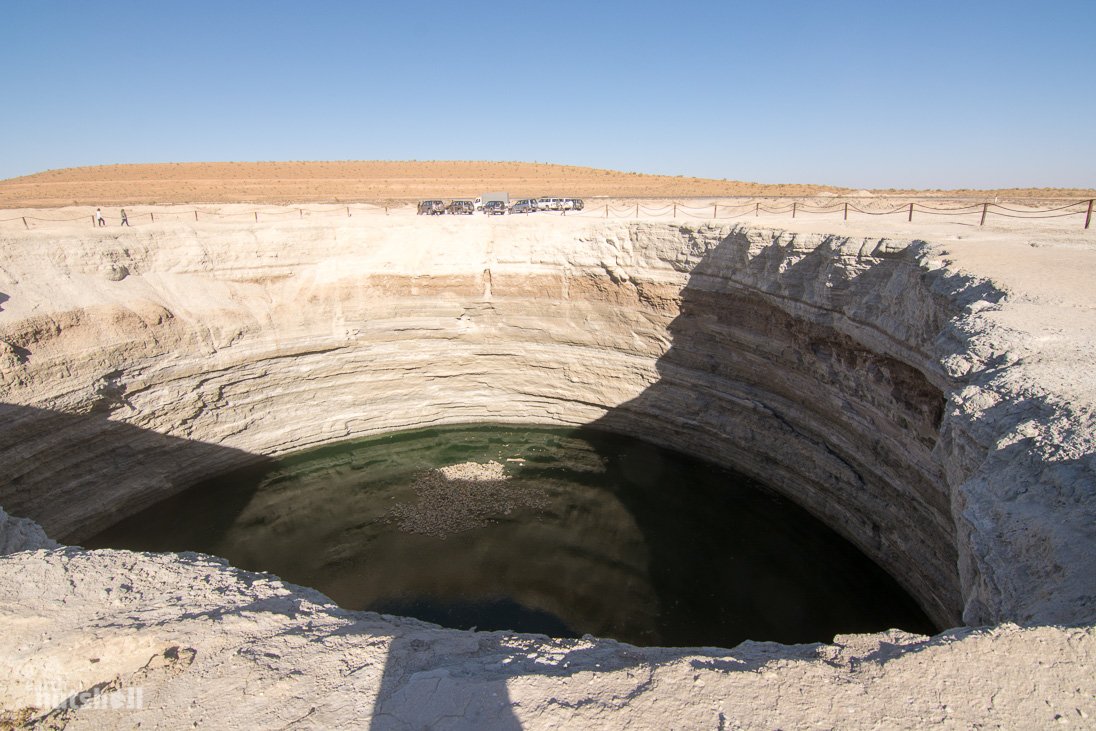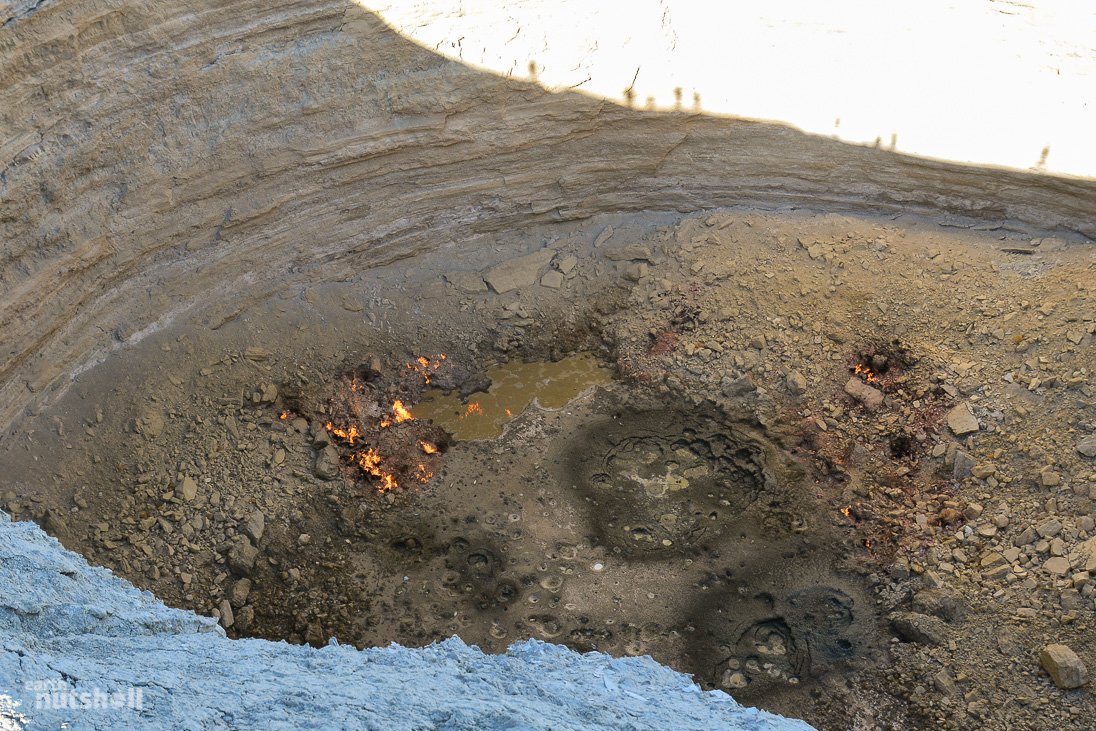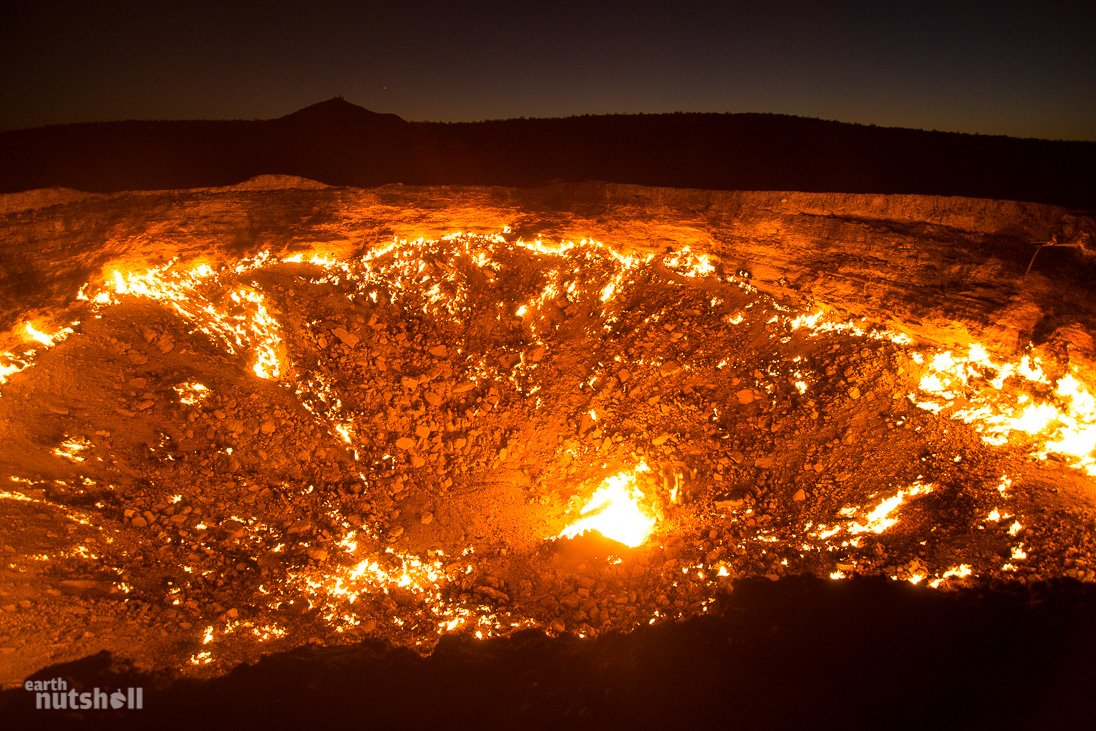
Image source:smithsonianmag.com
Our soundtrack for today will be ACDC's "Highway to hell" for a very good reason. Read on to find out...
Ok, as we all know in this series of posts we're looking through some weird natural phenomena. Well, what I'm presenting you today is a scientific slip literally. In 1971, Soviet scientists were touring the vast desert of Turkmenistan in search of oil and natural gas. Turkmenistan (for the ones who have never heard of it) is "a country in Central Asia, bordered by Kazakhstan to the northwest, Uzbekistan to the north and east, Afghanistan to the southeast, Iran to the south and southwest, and the Caspian Sea to the west".(wikipedia.org)
The first crater on our way to hell, the "Water Crater": A crater of murky water which still produces gas bubbles.

Second stop, the "Mud Crater": A crater full of mud that was ignited in 2012. The fire inside echoes incredibly as the shape of the pit works like a sound amplifier.

Hades' doorstep, the "Door to Hell": The main crater that formed in the accident back in 1971 and at nights looks like the entrance to the underworld.

The accident
As they were wandering around the Karakum Desert, geologists found what they thought as the perfect spot to set up their drilling rig. While they were studying the area, they found a natural gas pocket underneath their rig, but by that time it was already too late...the rig collapsed and an almost 230-feet-diameter-wide (that's about 70 meters) crater swallowed all their equipment (no records of human casualties were ever found). The collapse triggered a domino effect and several smaller craters formed in the vicinity.
The problem
The crater was almost 230 ft (70 m) wide and 100 ft (30 m) deep and gave off natural gas. Do you know what the basic ingredient of natural gas is? Methane (I hope you remember our non-toxic, odorless friend from my last post. He would come in the form of ice cubes, well in this case he is a lot hotter-pun intended). Whereas methane is a harmless gas it can displace oxygen, making it hard for living creatures to breathe. It is also extremely flammable. And if you've been paying close attention to my last post, you will remember that methane is also a greenhouse gas, far more damaging that CO2.
The gaffe
So, let's see what we got here: a huge pit emmitting flammable methane that smothers the animals of the area. Great! Who wouldn't want one just a few miles away from an inhabited village? Scientists brainstormed on how to fix their tiny, little mistake and then somebody thought: "Hey, I've seen gas drills before, people have this flaring thing all the time, we should do it too!"
And guess what happened. Since there was no other way of covering this crater up, they decided to ignite it with the hope that all its reserved gas would burn away in a few weeks...only it didn't! The fire has been burning ever since and has become a great tourist attraction. Although lots of locals remain completely unaware of its existence.
(FIY: Flaring is the process of burning the gas that cannot be captured and used in order to prevent methane from escaping into the atmosphere. Note that flaring wastes almost a million-dollar-worth gas a day in North Dakota. Imagine how much money those gas companies around the world lose every day, because they cannot take advantage of the all the gas they extract.)

Image source:tectono-business.com
Here is a great, informative video about the "Door to Hell"
Authority measures
In 2010 (somebody finally thought that 40 years were enough), the president of the country, Kurbanguly Berdymukhamedov, recommended taking measures in order to cover the crater, as it would get in the way of developing new natural gas fields in the area. Turkmenistan ranks 4th in the world list of natural gas reserves (wikipedia.org) and aimed at increasing its gas production for exports to other countries. But, as far as we know, the fire is still burning.
Scientific interest
In November 2013, George Kourounis, a Greek-Canadian explorer and storm chaser, became the first man to ever set foot in the firing pit. He wanted to collect samples in his attempt to study the chances of life existence in such extreme conditions. After collecting his samples, his studies revealed the existence of bacteria.

References
This was another strange phenomenon on our home-planet. Along with glowing algae, flammable ice cubes and volcano lightning they are only a few of the weirdest things you can view on your trip across the earth. Follow me, @ruth-girl, for more doses of wonder!
Don't forget to check the @steemstem project, a community-driven project meant to promote well-written, high-quality, STEM-related content (STEM as for Science, Technology, Engineering and Mathematics).
And for those interested in education, @steemiteducation is here to join all steemian educators in their common cause of making our job easier, more effective and more fun!
Until our next post,
Steem on, people, and keep smiling!

